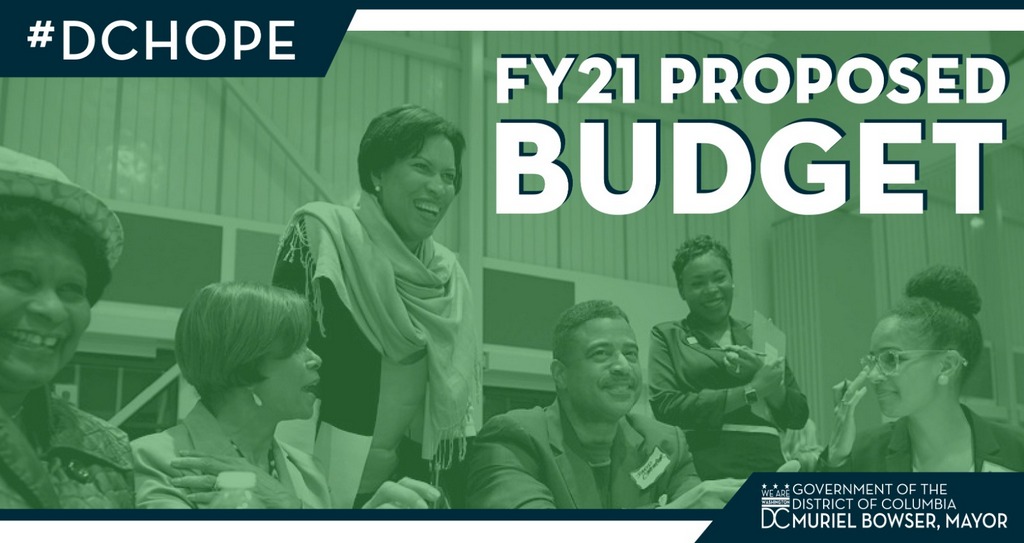[ad_1]
By Micha Green
AFRO D.C. Editor
[email protected]
Amid the coronavirus pandemic plaguing the nation’s capital, with 7,434 residents testing positive and 400 lives lost as of May 18, District of Columbia Mayor Muriel Bowser released her Fiscal Year (FY) 2021 Proposed Budget, which she has named #DCHOPE.
Despite the economic concerns surrounding the Mayor’s emergency shutdown in response to COVID-19, which has affected the finances of D.C. businesses and residents, the FY 2021 budget offers investment in education, transportation, environment, healthcare, housing, jobs and public safety by utilizing surplus funds and suggesting other revenue streams.

“The pandemic is creating a defining moment in D.C. The Mayor’s budget proposals for the current fiscal year and FY2021 take important steps to stave off large across-the-board budget cuts that would have deepened the downturn,” wrote the DC Fiscal Policy Institute in a statement sent to the AFRO. “We commend her decision to use some of the city’s reserves, the FY 2019 surplus, and other revenue proposals—such as closing tax loopholes.”
“In order to balance the budget the mayor reduced local government spending, utilized COVID-19 funding from the federal government, spent surplus funds from 2019 and tapped into reserve funds. I’m very happy to see that she was able to balance the budget without raising taxes,” wrote D.C. Council At-Large candidate Marcus Goodwin in a statement submitted to the AFRO.
Some highlights of the proposed budget include major investments in transportation, education, housing, health and public safety as well as suggested legislative amendments that would affect schools and the cannabis industry.
Transportation highlights include: $28.5 million in Ward-dedicated local street-paving maintenance; $56 million in roadway and intersection safety improvements, including: bike lanes, and trails to reduce injuries and traffic fatalities; $467 million to elevate streets, alleys and sidewalks to a “record level state of good repair;” $5.6 million towards safety improvements on Alabama Avenue S.E.; and $113 million for the D.C. streetcar, incorporating funding in order to extend the line to Benning Road Metro Station.
Education highlights include: $48 million to complete the city-wide Banneker High School in Shaw; $108 million to renovate facilities at the University of the District of Columbia; $74 million at 17 existing D.C. Public Schools to create 540 new early childhood development slots and 180 new pre-Kindergarten slots and several school renovations across all eight Wards.
Housing highlights include: $100 million for the Housing Production Trust Fund; $1 million for the Housing Preservation Fund; $19.5 million for programming and funds towards D.C. residents and D.C. government employments purchasing homes; and $76 million to rehabilitate the D.C. Housing Authority’s (DCHA) portfolio with $40 million dedicated towards improving DCHA facilities.
Health, Public Safety and Returning Citizens highlights include: $250 thousand to help returning citizens create their own businesses; $12.8 million towards Homeward DC to reduce homelessness, including funding for 96 new units for singles and 54 new units for families; $86 million in capital funds to purchase more emergency response vehicles; and $5 million for Safe at Home, which provides safety adaptations around the home for seniors citizens, and includes a $250 thousand grant for senior hearing aids.
Legislative Amendments include: offering tax abatements for developers who build housing with at least 350 units and rent at least one-third of the units at a rate that is affordable to those making less than 80 percent of the local median income; transferring the Medical Marijuana and Integrated Therapy (MMIT) responsibilities from the Department of Health (DOH) to the Alcoholic Beverage Regulation Administration (ABRA); and allowing existing public charter schools to share facilities with current D.C. Public Schools that have underutilized spaces.
While much was covered in Bowser’s proposed budget, there were also concerns regarding what the Mayor excluded, and some are urging the Council to make amendments before approving the FY 2021 budget.
Although they applauded her budget, the DCPFI noted that the mayor missed out on groups and underfunded programs.
“While the local fund budget protected and slightly expanded some crucial programs, it also missed an opportunity to respond to some immediate needs by failing to create a fund to stabilize child care providers, provide assistance to our undocumented brothers and sisters, and adequately fund the Affordable Housing Preservation Fund, among other needs,” DCPFI wrote. “We urge the D.C. Council to build on the Mayor’s proposal to ensure that the final budget adequately funds crucial investments that are needed to build a stronger, more just recovery.”
Goodwin suggested the budget needed further support for local entrepreneurs.
“I would like to see our small and local business owners get more support so that they can hire back displaced workers and start the path towards an economic recovery. There have been 85,000 unemployment claims in DC in just the past [eight] weeks!”
With social distancing recommendations the D.C. Council will hold virtual public hearings for the proposed FY 2021 budget beginning May 20 and concluding on June 16. The Council encourages residents to participate and submit written or transcribed testimonies. To submit a written testimony email: [email protected] or to leave a voicemail testimony call (202) 430-6948.
[ad_2]
Source link
